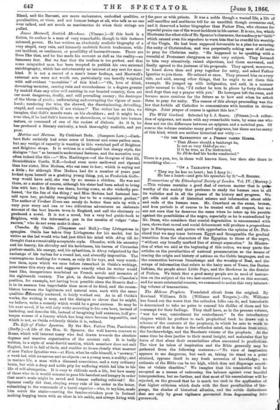bert Bede certainly had some sense of humour and some
pathos once, " That Homer should a bankrupt be, but any vestige of capacity is wanting in this wretched puff of Brighton Is not so very Odd-dye-see:
and Brighton shops. It is written in a colloquial but slangy style, the If it be true, as I'm instructed,
dialogue " fast " as barmaids understand fastness, and the narrative very So Ill-he-had his books conducted."
than her sister, Miss Medusa, who sat near to her; which is saying not "055 A TALKATIVE PEER.
a little ; for although Miss Medusa had for a number of years past "They say he has no heart ; but I deny it : looked upon herself as a gushing young thing, yet, as Frederick He has a heart—and gets his speeches by it."—S. ROGERS.
way would have said, she was by no means a chicken. He was not Transactions of the Ethnological Society of London. Vol. IV. (Murray.), there, as a matter of course, although his sister had been asked to bring —This volume contains a good deal of cmiotts matter that is quills, him with her; for Kitty was there, having come, as she wickedly pro- worthy of the society that professes to study the human race in all hissed, for the fun of the thing ;' and Miss Medusa had fastened her- its varieties and in all the phases of its history and progress. We self upon her, probably recognising her to be a companion gusher." get odds and ends of historical science and information about odds. The author of Verdant Green can surely do better than mix up with a and ends of the human race. Mr. Crawfurd on the stone, bronze,. very poor story and one or two ridiculous adventures an elaborate and iron periods is of course to be treated with all respect, but we- account of the best known town in England, and call the electuary so are not sure that he deserves the same when he takes up his parable, produced a novel. It is not a novel, but a very bad guide-book to against the possibilities of the negro, especially as he is contradicted by Brighton, with the information put in the mouths of vulgar " aha- Mr. Dunn, who considers that cranial degradation is unconnected with






























 Previous page
Previous page